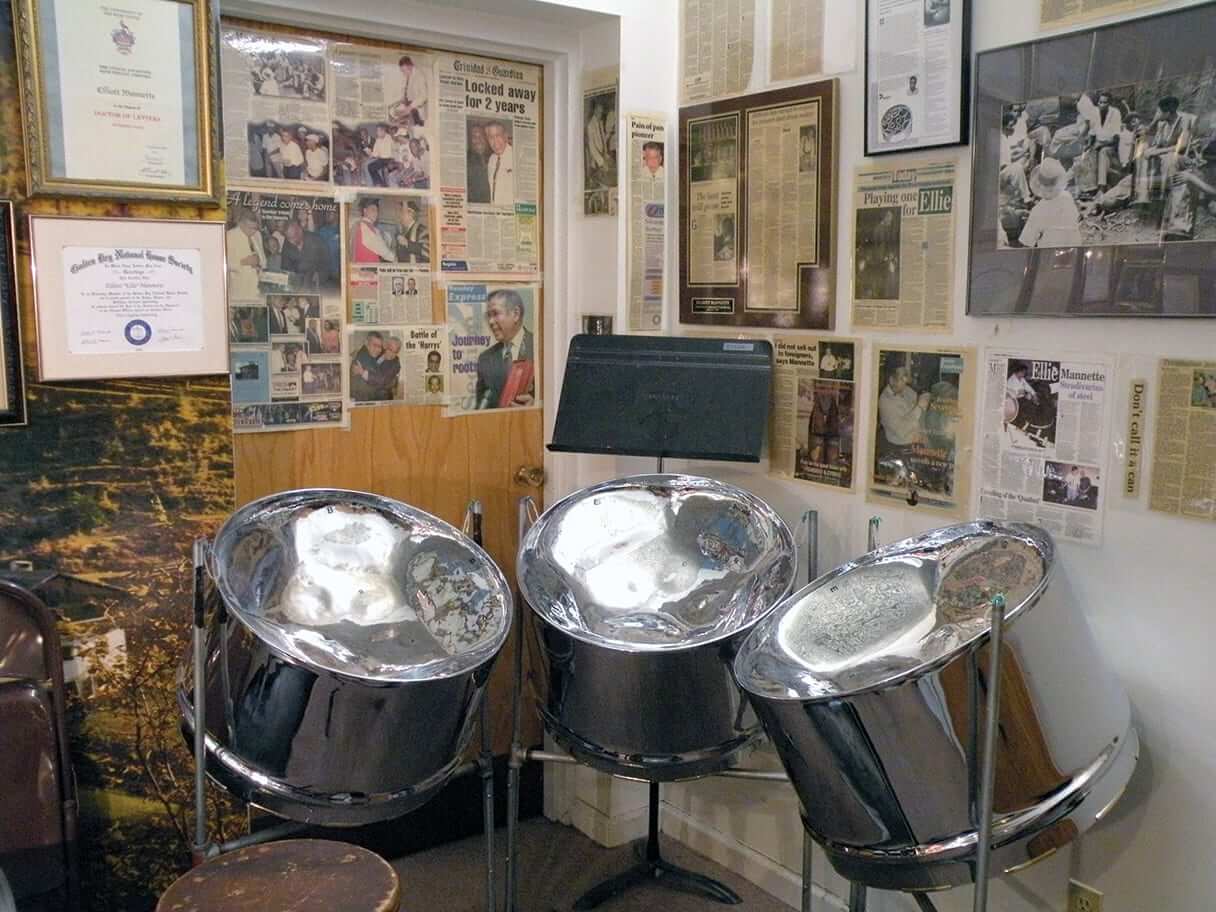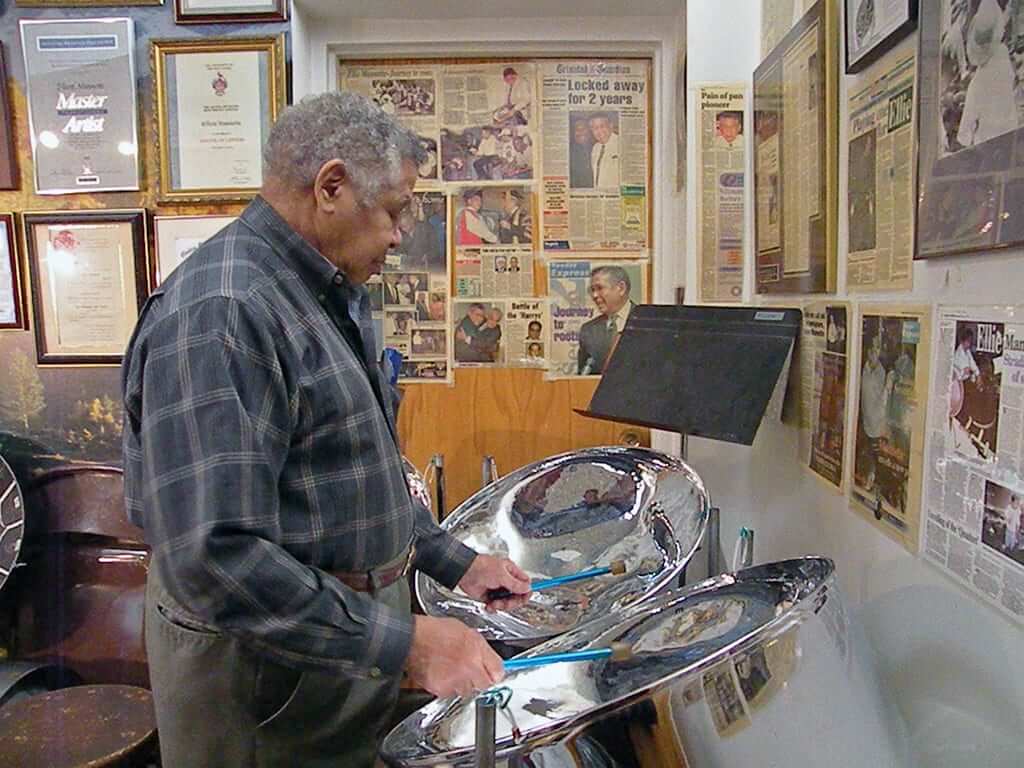Already a revered world music pioneer when we profiled him in 2009, steel drum innovator Ellie Mannette lived out his creative and productive last quarter-century in West Virginia.
Morgantown native Chanler Bailey had an epiphany in the spring of 2002. He had traveled to the second European Steel Band Festival on the Mediterranean coast of France with his mentor, panman Ellie Mannette. Dozens of steelpan bands from across Europe were gathered to perform. Seated in an outdoor auditorium overlooking the sea, enjoying a band from Finland, it suddenly hit Bailey: Without Mannette and a small number of other Trinidadians, they wouldn’t be gathered—in fact, the steel drum and orchestra and its ethereal music never would have come into being at all. Those few men, Mannette prominent among them, had improved the universe in a significant and beautiful way.
Our Spring 2009 second issue recounted Mannette’s story: how rival street bands in 1940s Trinidad fashioned makeshift melodious metal drums by hand, and how he, as a teenage member of one of those bands, built the first steel drum made from a 55-gallon oil barrel; his two musical decades with the U.S. Navy; his shift in the late 1960s to criss-crossing the U.S. to teach school music programs how to handcraft instruments and start their own steel bands.

Mannette was already in his 60s when, in 1991, then–West Virginia University College of Creative Arts Dean Philip Faini invited him to spend a semester as artist-in-residence, part of the college’s eclectic percussion program and its World Music Center. Bailey was finishing up a degree in percussion performance. When he took an interest in the hand-hammering and tuning process, Mannette recognized “the jumbie” in Bailey. That’s a Trinidadian creole term for “when steel drums get under your skin and you can’t get away from how exciting it is,” Bailey explains. Through the University Tuning Project, where apprentices created steel drums for high school and college music programs across the nation, Mannette came to see the jumbie in others, too—and maybe came to feel his own jumbie for West Virginia.
“He’d been doing clinics and lectures and workshops across the country for decades. He would go back a year later, and people he had worked with had forgotten more than they’d learned,” Bailey says. “Here in Morgantown was finally a group of people who were really interested and showed ability. He stayed because we got better, and we got better because he stayed.”
WVU rewarded Mannette’s extended teaching commitment with the flexibility to continue his work across the country. When he’d been teaching here for nearly a decade, Mannette was able to carve out time on the side to establish Mannette Steel Drums, where as many as 20 workers hand-hammered and precision-tuned drums. And when MSD got through its initial five-year order backlog and faltered, WVU’s Business Incubator helped out with marketing and business planning.

Mannette viewed WVU’s support as the icing on the cake of his life’s work—he told me this when I had the opportunity to talk with him in 2003. “I have worked all my life with steel bands, around the world, America, Europe, wherever, and I never really had the support, financial or academic or anything, that I feel here,” he said. “The work I’ve put into the art form with this college standing behind me—I cannot explain what I feel about this university. I’ve had several offers from other universities and I’ve said to people across the country, there’s no way I would turn my back on this university—they would have to throw me out. It’s an honor for me to have received the support I have received.”
Mannette’s mentorship infused the entire industry with his vision and skill. “You can tie just about everybody who’s connected with the art form on the manufacturing side directly to Ellie,” Bailey says. In Morgantown and West Virginia, he estimates the programs inspired by Mannette’s presence have touched hundreds of schoolchildren, although we think it must be in the thousands. He’s less conservative when he talks about the goodwill for West Virginia Mannette spread around the world. “Who else has gotten on the BBC and said ‘West Virginia University’ five times in an interview? You can’t get better promotion than that.”
A proud and grateful West Virginian by choice, the Father of the Modern Steel Drum received a National Heritage Fellowship from the National Endowment for the Arts in 1999 for his part in advancing the steel drum, which included innovating seven of the 10 instruments in today’s steel drum family. Also among his many accolades, Mannette received the West Virginia Music Hall of Fame’s Spirit Award in 2017. He died in Morgantown in August 2018 at the age of 90.
At the business Mannette founded, now known as Mannette Musical Instruments, a staff of five continue to hand-hammer and tune the ends of steel barrels, crafting about 100 of the instruments Bailey calls “performance sculptures” each year. “Continuing Ellie’s legacy is a way that we can pay tribute to a guy who’s meant so much to all of us,” Bailey says. “He always said, ‘It’s up to you guys to take what I’ve taught you and move it to the next level,’ and that’s what we all want to do.”











Leave a Reply